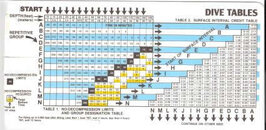Steve_C:
60 matters some places but not so much in others. Most of the dive sites I dive off NC the bottom is 80-100 ft. I see lots of OW divers on the 80ft dives and some on the 100 ft dives such as our ledges. A popular dive with NEW OW divers is the Hyde. Bottom at 80-85. Top deck at 60. A typical dive may spend some time at 60, some time at 80-85, some time back up at 60. I have instabuddied with new OW divers on the Hyde and they had maybe 4-6 quarry dives prior to our meeting up. And now a there are usually two dives a trip and the SI is about an hour. Second sometimes on the Markham where you are varying from 40 on top to 85 in the sand but everybody hits the sand to see the big props.
Those dives should not be permitted whether the guy has a computer or not. If we are giving people computers so that they may violate the limits set by their training then that requires a different discussion, much serious than the one we are having. Now if an open water diver accidentally loses buoyancy then that is a situation that he can easily address without having a computer. Every 10 feet of unintentional buoyancy loss below 60 takes 10 minutes off your max time of 60 minutes. 70 ft will mean dive will now last 50 minutes and 80 feet will mean dive will last 40 minutes instead of 60.
I am sorry CAPTAIN SINBAD, that we have never met, nor have we ever discussed diving in the past, but I take it that you are a man who is subject to rules that make sense. I too am one of these types. I am in IT, and if it doesn't make sense, something is "fishy" and shouldn't be done.
Those dives should not be permitted whether the guy has a computer or not.
... Huh? Are you basing this on logic, or experience for which you have personal knowledge? I ask this because everyone has different personal experiences to draw from, especially underwater experiences. In my own experiences, my checkout dive was with my instructor at 60' as I followed him as he was spear fishing. Does this make me a better diver or a lacking diver? No, it is just how comfortable my instructor felt I was in the water (early 1980s).
Now if an open water diver accidentally loses buoyancy then that is a situation that he can easily address without having a computer. Every 10 feet of unintentional buoyancy loss below 60 takes 10 minutes off your max time of 60 minutes. 70 ft will mean dive will now last 50 minutes and 80 feet will mean dive will last 40 minutes instead of 60."
... Again, Huh? If an Open Water Diver is trained on their computer and dive tables (tables taught in every single OW course today), are they not capable of working their dive tables and their computer? Does a computer immediately mean the new diver is in danger? Based on your post, it seems your answer is yes, but I am not certain and would like a specific clarification (Please).
Honestly, I have taken a number of OW courses, and I have sat in on a few OW computer courses to critique their teaching process'. No course I have observed has relied completely on a computer... Honestly, they all have reverted back to tables as the ultimate source in a computer failure...
By the way, when I was certified, the OW cert was good for 240', or the point of O2 toxicity... On another note, my first dive with my dive shop after certification was a trip to South Florida, where the first dive was on the Mercedes when it was fully intact... 90' to the top, and I was invited in by the dive master to penetrate through the wreck... I was comfortable with my experience and the experience of the dive master to take him up on the invite and had a memorable experience... Thank goodness the dive police were not onsite!





